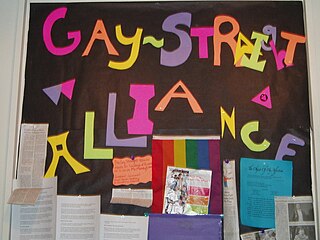
Lesbian, gay, bisexual, and transgender (LGBT) movements are social movements that advocate for LGBT people in society. Although there is not a primary or an overarching central organization that represents all LGBT people and their interests, numerous LGBT rights organizations are active worldwide. The first organization to promote LGBT rights was the Scientific-Humanitarian Committee, founded in 1897 in Berlin.

Walter Whitman Jr. was an American poet, essayist, and journalist. He is considered one of the most influential poets in American literature. Whitman incorporated both transcendentalism and realism in his writings and is often called the father of free verse. His work was controversial in his time, particularly his 1855 poetry collection Leaves of Grass, which was described by some as obscene for its overt sensuality.

Coming out of the closet, often shortened to coming out, is a metaphor used to describe LGBT people's self-disclosure of their sexual orientation, romantic orientation or gender identity.

A gay–straight alliance, gender-sexuality alliance (GSA) or queer–straight alliance (QSA) is a student-led or community-based organization, found in middle schools, high schools, colleges, and universities. These are primarily in the United States and Canada. Gay–straight alliance is intended to provide a safe and supportive environment for lesbian, gay, bisexual, transgender, and all LGBTQ+ individuals, children, teenagers, and youth as well as their cisgender heterosexual allies. The first GSAs were established in the 1980s. Scientific studies show that GSAs have positive academic, health, and social impacts on schoolchildren of a minority sexual orientation and/or gender identity. Numerous judicial decisions in United States federal and state court jurisdictions have upheld the establishment of GSAs in schools, and the right to use that name for them.

Francis Otto Matthiessen was an educator, scholar and literary critic influential in the fields of American literature and American studies. His best known work, American Renaissance: Art and Expression in the Age of Emerson and Whitman, celebrated the achievements of several 19th-century American authors and had a profound impact on a generation of scholars. It also established American Renaissance as the common term to refer to American literature of the mid-nineteenth century. Matthiessen was known for his support of liberal causes and progressive politics. His contributions to the Harvard University community have been memorialized in several ways, including an endowed visiting professorship.

Harvey Milk High School (HMHS) is a public high school in the East Village of Lower Manhattan in New York City designed for, though not limited to, gay, lesbian, bisexual, and transgender young people, as well as those questioning their sexuality and gender identity. It is named after San Francisco, California, supervisor Harvey Milk, the first openly gay man to be elected to a public office in the United States.

Oak Lawn is a neighborhood in Dallas, Texas, defined in Dallas City Ordinance 21859 as Planned Development District No. 193, the Oak Lawn Special Purpose District. The unofficial boundaries are Turtle Creek Boulevard, Central Expressway, the City of Highland Park, Inwood Road, and Harry Hines Boulevard. It is over 12 square miles (31 km2) in area. Officially it is bounded by the City of Highland Park, the North Central Expressway, Stemmons Freeway, Woodall Rodgers Freeway, and other roads. The district is within the boundary defined by the City of Dallas law, excluding any existing planned development districts within.

LGBT history dates back to the first recorded instances of same-sex love and sexuality of ancient civilizations, involving the history of lesbian, gay, bisexual, and transgender (LGBT) peoples and cultures around the world. What survives after many centuries of persecution—resulting in shame, suppression, and secrecy—has only in more recent decades been pursued and interwoven into more mainstream historical narratives.

LGBT culture is a culture shared by lesbian, gay, bisexual, transgender, and queer individuals. It is sometimes referred to as queer culture, while the term gay culture may be used to mean either "LGBT culture" or homosexual culture specifically.
LGBT History Month is an annual month-long observance of lesbian, gay, bisexual and transgender history, and the history of the gay rights and related civil rights movements. It was founded in 1994 by Missouri high-school history teacher Rodney Wilson. LGBT History Month provides role models, builds community, and represents a civil rights statement about the contributions of the LGBTQ+ community. As of 2022, LGBT History Month is a month-long celebration that is specific to Australia, Canada, Cuba, Finland, Germany, Hungary, Italy, the United Kingdom and the United States.

The Bisexual Resource Center (BRC) is a 501(c)(3) non-profit educational organization headquartered in Boston, Massachusetts, that has served the bisexual community since 1985. Originally known as The East Coast Bisexual Network, it incorporated in 1989 as a 501(c)(3) nonprofit and changed its name to the Bisexual Resource Center in 1993.

Bisexual erasure, also called bisexual invisibility, is the tendency to ignore, remove, falsify, or re-explain evidence of bisexuality in history, academia, the news media, and other primary sources.

The International Bear Brotherhood Flag, also known as the bear flag, is a pride flag designed to represent the bear subculture within the LGBTQIA+ community. The colors of the flag—dark brown, orange/rust, golden yellow, tan, white, gray, and black—symbolize species of animal bears throughout the world. Though not necessarily referring to human skin color or hair color, the flag was designed with inclusion in mind. The bear culture celebrates secondary sex characteristics such as growth of body hair and facial hair, traits associated with bears.

Timeline of events related to sexual orientation and medicine

The Houston GLBT Community Center was a community center for gay, lesbian, bisexual, and transgender people and their allies in the Houston metropolitan area and southeast Texas. Its last location was in the Dow School building in the Sixth Ward of Houston.
Throughout Dallas–Fort Worth, there is a large lesbian, gay, bisexual, and transgender community. Since 2005, DFW has constituted one of the largest LGBT communities in Texas.
Homophobia in ethnic minority communities is any negative prejudice or form of discrimination in ethnic minority communities in the UK and USA towards people who identify as–or are perceived as being–lesbian, gay, bisexual or transgender (LGBT), known as homophobia. This may be expressed as antipathy, contempt, prejudice, aversion, hatred, irrational fear, and is sometimes related to religious beliefs. A 2006 study by the Joseph Rowntree Foundation in the UK found that while religion can have a positive function in many LGB Black and Minority Ethnic (BME) communities, it can also play a role in supporting homophobia.
Homosocialization or LGBT socialization is the process by which LGBT people meet, relate and become integrated in the LGBT community, especially with people of the same sexual orientation and gender identity, helping to build their own identity as well.
EAGLES Academy Central High School was a public high school located in Hollywood, Los Angeles, with the target group of but not limited to gay, lesbian, bisexual, and transgender young people, as well as those questioning their sexuality and educational dropouts. It was founded and opened in 1992 along with the "Educational Options" program by the Los Angeles Unified School District (LAUSD); it closed down in 2004. It was the first public high school designed for LGBT youth from grade 7 onwards in the United States.
James T. Sears is an American educator, historian, and activist. He is a former professor at the University of South Carolina, Trinity University, Harvard University, and Penn State. The author of books about LGBT history and sexuality education, his archive of correspondence, research notes, interviews is located at the Rubenstein Library of Duke University with ancillary materials at the College of Charleston Special Collections.












